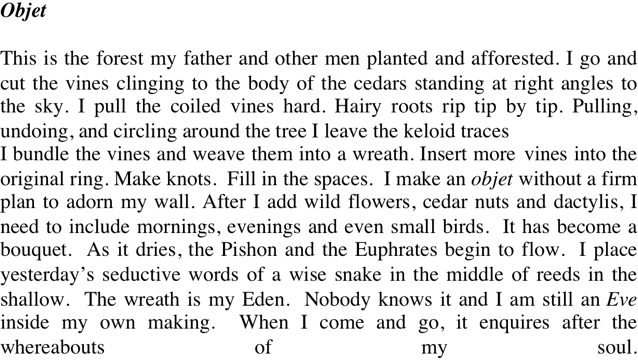Three poems by Ikuko Tanaka – translated by Miho Kinnas & Shelly Bryant
1.
雪の時間
深雪に埋めつくされた苅田は見知らぬ国の原
降り積んだ雪に記憶の風が
吹き寄せ吹きだまりができる
斜面ができる
さらに雪が降りさらに風が吹き
やがて像の耳がかたどられていった
いま おさない象が群れからはぐれたのだ
はぐれた象のために
吹雪はひそかに胴体の輪郭を描いていった
さらに雪は降りさらに風は吹き
胴体のつづきに長い鼻の輪郭を描いていった
ああ やっと
低い声で助けの信号を送りはじめたのだ
しかし 風は吹き荒れ雪を舞い上げ
やっと伸ばした鼻を消し去り
胴体を消し去り
耳のかたちひとつだけを残した
谷間の川面から吹き上げる風が
ほうほうと身をよじり
象とたわむれているのだ
だが 聞く耳ひとつあればいい
わたしは ふと自分の耳に触ってみる
わたしの一番深いところでねむっている無数の耳
忘れている耳
はぐれたわたしの耳のために
吹雪はやがてわたしの耳をかたどり始める
そのように雪は降りつづき
そのように風は吹きつづけ
Snow Time
The bare paddy field buried in deep snow is an unknown field
The wind of memory blows over the piled snow
The snow drifts
The snow slides
Some more snow falls, some more wind blows
And the drift is shaped into an elephant ear
Now a young elephant has strayed from the herd
For the stray elephant
the snowstorm slowly begins to draw his body
Some more snow falls, some more wind blows
Following the body the snowstorm outlines the trunk
Ahh- finally
a distress signal is sent out in a low voice
But the wind roughens and blows up the snow
the painstakingly stretched trunk is erased
the body is erased
only one ear is left
The wind blows, ho ho, from the river surface
in the valley twisting
and playing with the elephant
You know, though, one ear to listen is enough
I now touch my own ears
A countless number of ears are asleep
in the deepest place
The forgotten ears
For my stray ears
the snow storm begins to mold my ear
Thus some more snow falls
Thus some more wind blows
~
2.
カヤパの庭
今夜、鶏が鳴く前にあなたは三度わたしを知らないと言うだろう マタイ二十六章
ゆうぐれの窓から
ぼんやりと椿の花を見続けると
心の底までのぞき込まれていると思う日がやってくる
赤い花の芯にとらえられ つつぬけにのぞき込まれてしまう
誘われるままに樹の下をくぐり敷石を横にたどり裏口から
あの人が裁かれているというカヤパの中庭に入る
大祭司カヤパの庭にも椿の花がいっぱい咲いていて
わたしが葉と葉の間から見ていると
「何をいっているのかわからない」と一番弟子の男が否んだ
二千年前の炭火が赤く燃え 裏切るもの死刑を望むもの
しもべや女中が集まっていた
またしても「そんな人は知らない」恐れて誓う声がした
遠く波打つガリラヤの湖から一匹の魚が泳ぎ去った
わたしが赤い花をのぞくと 男の涙がこぼれそうだった
こんなところに誰がつまずく石を置いたのだろう
三度目の声がまたしても
「その人のことは何も知らない」と言うと
追い打ちをかけるように女中が
[この人はナザレ人イエスと一緒だった]と言った
それはわたしの声だった わたしはそこにもいたのだ
静かなゆうぐれに包まれると椿の花がまっ赤に咲いて
ぼんやりしていると 鶏が鳴いて男は外に出て激しく泣く
いつのまにか二千年はあっけなく過ぎて
そのまま赤い花の形をして地面に落ちるものがある
罪も弱さもそのまま受け継いで
わたしはカヤパの庭を行ったり来たりしている
Caiaphas’ Courtyard
Verily I say unto thee, that this night, before the cock crow, thou shalt deny me thrice Matthews 26
Out of the window of twilight
I gaze blankly at the camellia blossoms
There comes a day the camellia sees
through to the bottom of my heart
Caught by the core of the red blossom
through and through I am seen
Being led I stoop under the branches
and step into Caiaphas’ courtyard from the back gate
where he is said to be judged
The high priest Caiaphas’ courtyard is also
filled with camellia blossoms
I watch from the space between the leaves
He denied, saying, I know not what thou sayest
Two thousand year old charcoal burns deep
who betrays and wants death
a crowd of servants and maids gathered
And again he denied with an oath, I do not know the man
A fish swims away from the far away heaving lake of Galilee
I look inside the burning
and see his tear about to overflow
Who left a stumbling stone, here?
For the third time I hear the voice, saying, I know not the man
Another maid said unto them that were there,
This fellow was also with Jesus of Nazareth
That was my voice;
I was there, too
Camellias, wrapped by the dusk, open their crimson petals
I am lost in thought; the cock crow, and the man goes outside,
cries out
Unnoticed, two thousand years have passed
Unchanged, something in the shape of a red flower
falls onto the ground passing on
Sins and weaknesses
I go to and from Caiaphas’ courtyard
~
3.
オブジェ
かつて 父たちが植林し造林につとめた杉山に分け入っ
たことがある 天に垂直なその杉の木に絡みついたカズ
ラを切るのだ きつく巻きついた紐状のものを力ずくで
引っ張る 細い毛根がびりびりと剥がれる 引きながら
解きながら木の周りをぐるぐる回る 解くと締めつけら
れた跡がケロイドのようだ
わたしは 解いたカズラを束ねて 一つの輪に編んで行
く 最初の輪につぎつぎ絡ませ 縄目を作り隙間を埋め
ながら 偶然にゆだねてオブジェを作る 壁掛けを作っ
ていく 隙間には野の花と杉の実とカモガヤの野を飾る
と 朝と夕を加え小鳥も加えることになって ドライフ
ラワーの壁掛けとなる やがて乾いてくるとピソンの川
もユフラテの川も流れはじめる 浅瀬の葦の間にきのう
誘われた聡い蛇のことばを置く これがわたしの園であ
る それを玄関に飾る 誰にも気づかれない わたしだ
けのオブジェの中で わたしは いまだエバのままであ
り 出る時も入る時も 魂のありかをとわれつづけてい
るように思う

(Miho Kinnas’s translation of an essay by Akira Kisa, Where Bibliobattles Are was published in Asian Literary Journal Cha in June, 2017. More poems by Ikuko Tanaka in translation can be found at Poetry Kanto.)
Continue reading